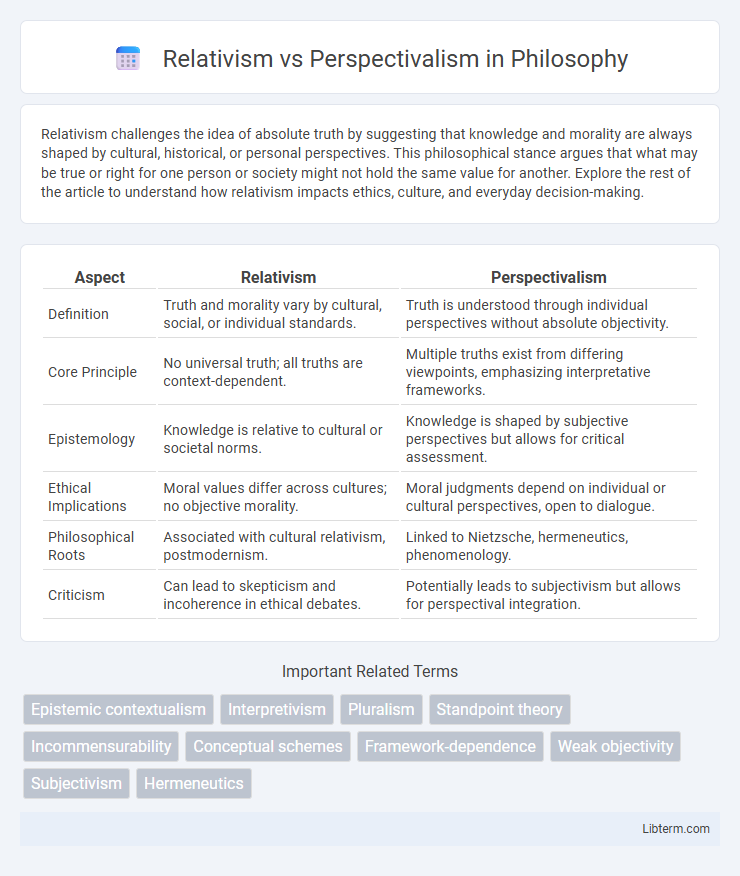Relativism challenges the idea of absolute truth by suggesting that knowledge and morality are always shaped by cultural, historical, or personal perspectives. This philosophical stance argues that what may be true or right for one person or society might not hold the same value for another. Explore the rest of the article to understand how relativism impacts ethics, culture, and everyday decision-making.
Table of Comparison
| Aspect | Relativism | Perspectivalism |
|---|---|---|
| Definition | Truth and morality vary by cultural, social, or individual standards. | Truth is understood through individual perspectives without absolute objectivity. |
| Core Principle | No universal truth; all truths are context-dependent. | Multiple truths exist from differing viewpoints, emphasizing interpretative frameworks. |
| Epistemology | Knowledge is relative to cultural or societal norms. | Knowledge is shaped by subjective perspectives but allows for critical assessment. |
| Ethical Implications | Moral values differ across cultures; no objective morality. | Moral judgments depend on individual or cultural perspectives, open to dialogue. |
| Philosophical Roots | Associated with cultural relativism, postmodernism. | Linked to Nietzsche, hermeneutics, phenomenology. |
| Criticism | Can lead to skepticism and incoherence in ethical debates. | Potentially leads to subjectivism but allows for perspectival integration. |
Defining Relativism: Core Concepts
Relativism asserts that truth and moral values vary depending on social, cultural, or individual perspectives, denying any absolute or universal standards. It emphasizes that knowledge, ethics, and reality are context-dependent and shaped by specific historical or cultural frameworks. This stance challenges objective claims by proposing that all viewpoints hold equal validity within their own contexts.
Understanding Perspectivalism: An Overview
Perspectivalism posits that knowledge and truth are always interpreted from particular viewpoints, emphasizing the role of context and standpoint in shaping understanding. Unlike relativism, which often suggests that truth varies arbitrarily between cultures or individuals, perspectivalism maintains that multiple perspectives can coexist with a degree of objective validity grounded in their specific frameworks. This approach highlights the dynamic interplay between observer and subject, underscoring that perspectives provide partial but essential insights into complex realities.
Historical Roots of Relativism
Relativism traces its historical roots to ancient Greek sophists who argued that truth and morality vary depending on cultural or individual perspectives. This philosophical stance contrasts with perspectivalism, which holds that knowledge is always from a particular viewpoint but does not deny the possibility of objective truths. Key figures such as Protagoras and later Michel Foucault shaped the development of relativistic thought by emphasizing the contingent and context-dependent nature of knowledge and ethics.
Philosophical Origins of Perspectivalism
Perspectivalism originated from early modern philosophical inquiries into the nature of knowledge, particularly through the works of Nietzsche, who emphasized that all knowledge is interpreted through individual perspectives rather than absolute truths. Unlike relativism, which asserts that truth varies between cultures or frameworks without a fixed standard, perspectivalism argues that objectivity arises from the dynamic interaction of multiple subjective viewpoints. This philosophical stance roots its debates in epistemology and metaphysics, highlighting the limits and conditions of human understanding shaped by cognitive and cultural factors.
Key Differences Between Relativism and Perspectivalism
Relativism asserts that truth and morality vary based on cultural or individual frameworks, denying universal standards, whereas perspectivalism maintains that knowledge is influenced by perspective but not entirely relative, allowing for objective elements within different viewpoints. Key differences include relativism's broad rejection of absolute truths contrasted with perspectivalism's nuanced recognition of partial truths shaped by context and standpoint. Perspectivalism acknowledges the value of multiple perspectives without equating all truths, promoting a dynamic understanding that relativism often disputes.
Relativism in Ethics and Morality
Relativism in ethics asserts that moral principles are not universal but vary according to cultural, social, or individual perspectives, emphasizing that what is considered morally right in one context may be deemed wrong in another. This approach challenges absolute moral standards by highlighting the influence of historical, cultural, and situational factors on ethical judgments. Critiques often center on relativism's potential to undermine objective moral evaluation and its difficulty addressing conflicting moral claims across diverse communities.
Perspectivalism in Epistemology and Knowledge
Perspectivalism in epistemology asserts that knowledge and truth depend on the viewpoint or framework of the knower, emphasizing the contextual and interpretative nature of understanding. Unlike relativism, which posits that all viewpoints are equally valid, perspectivalism holds that some perspectives provide more reliable or accurate knowledge based on criteria such as coherence, explanatory power, and empirical adequacy. This approach highlights the dynamic and situated character of knowledge, recognizing that different perspectives can yield complementary insights without collapsing into absolute relativism.
Criticisms and Challenges to Relativism
Relativism faces significant criticisms for undermining objective truth and enabling contradictory beliefs to hold equal validity, which challenges logical coherence. Critics argue that relativism leads to moral and epistemic nihilism by denying universal standards and making cross-cultural or interpersonal dialogue problematic. The inability to resolve disputes or justify normative claims under relativism highlights its practical and philosophical limitations.
Debates Surrounding Perspectivalism
Debates surrounding perspectivalism center on its claim that knowledge and truth are always situated within specific perspectives, challenging absolutist notions inherent in relativism. Critics argue perspectivalism risks inconsistency by allowing multiple, potentially conflicting viewpoints to hold validity simultaneously. Proponents emphasize its nuanced approach to epistemology, highlighting how contextual frameworks influence understanding without descending into full relativism.
Contemporary Relevance: Relativism vs Perspectivalism
Relativism asserts that truth and morality vary depending on cultural or individual perspectives, challenging absolute standards in contemporary social and ethical debates. Perspectivalism, by contrast, acknowledges multiple viewpoints while seeking a higher-order coherence or integrative understanding that transcends mere subjectivity. The contemporary relevance of these positions lies in their influence on global ethics, intercultural dialogue, and conflicts over knowledge claims in a pluralistic world.
Relativism Infographic

 libterm.com
libterm.com